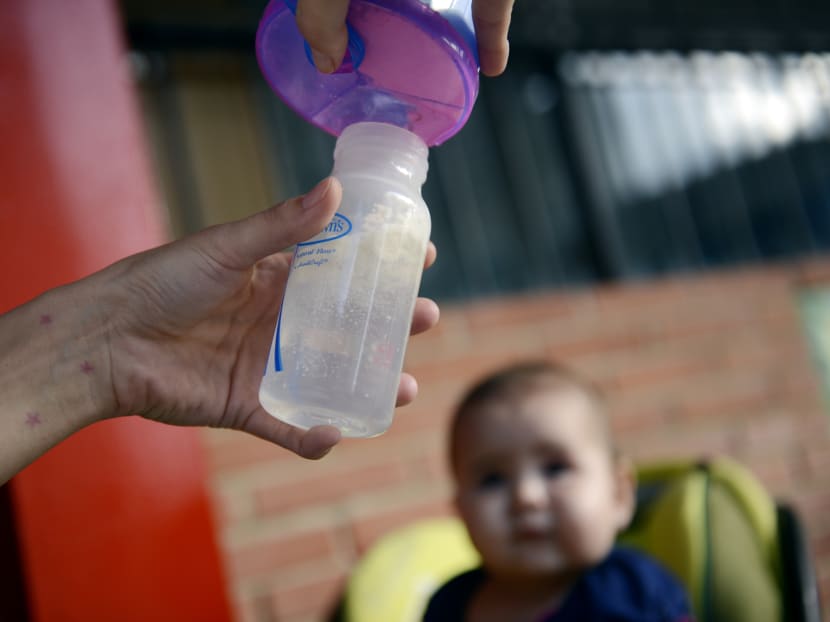Milk brands use premium image, consumer behaviour to drive prices up: CCS
SINGAPORE — Brand loyalty and a penchant for premium products among parents here have driven formula milk companies to invest heavily in marketing and research and development.
And this, in turn, could reinforce such consumer behaviour, the Competition Commission of Singapore (CCS) said.
SINGAPORE — Brand loyalty and a penchant for premium products among parents here have driven formula milk companies to invest heavily in marketing and research and development.
And this, in turn, could reinforce such consumer behaviour, the Competition Commission of Singapore (CCS) said.
This was among the findings in the commission’s report released on Wednesday (May 10), which showed that manufacturers have resorted to non-price competition and aggressive marketing to increase their share of a small Singapore market with limited growth.
As a result, formula milk prices here as of May last year were found to be higher, compared with several other countries such as Australia, United States and United Kingdom.
Total marketing expenditure by all six major manufacturers — including Abbott, Mead Johnson and Danone — soared by 42.4 per cent between 2010 and 2014, contributing to more than double the average retail price of formula milk over the past nine years.
Triggered by public concern over the rising prices, CCS’ year-long market inquiry sought to understand the supply chain, suss out the nature of competition in the industry, and assess if there was scope to increase competition, among other objectives.
Feedback was gathered from manufacturers, distributors, retailers, hospitals and government agencies.
The commission found that manufacturers, which were well aware that the only alternative to formula is breast milk, have chosen to shun price competition. Instead, they focused on constructing a premium brand image and introducing new ingredients purporting attributes desired by consumers.
“Such ‘premiumisation’ strategies further strengthen consumer perceptions and entrench consumer purchasing behaviours, which in turn give formula milk manufacturers the market power to increase wholesale prices, in the face of limited volume growth prospect due to low birth rate and rising breastfeeding rate,” said the CCS.
The report cited the experience of an unnamed supermarket, which had previously brought in a “value-for-money” formula milk brand after receiving customer feedback on the high prices of other options.
Although the new product belonged to an established brand and was priced lower than other premium brands, sales were poor and the product was discontinued by the manufacturer.
Other retailers had similar experiences: Another supermarket noted that this product had been underperforming while a pharmacy stopped selling it after less than a year due to a lack of demand.
Market researcher Euromonitor International noted in a July 2016 report that the focus on premium products was not unique to Singapore.
Across Asia, manufacturers have been increasingly playing up the quality of their formula milk to retain margins in light of rising breastfeeding rates and low birth rates constraining volume growth.
In Singapore, the CCS found that an estimated 95 per cent of formula milk sales in 2015 belonged to premium and specialty milk, while the remaining was standard milk.
“Insufficient understanding of the nutritional content of formula milk and the dietary requirements of infants and young children have often led parents to perceive that the more expensive or premium products are of higher quality,” said the CCS.
The commission stressed that all infant formula milk products in Singapore meet the safety standards and nutrient composition requirements under the Singapore Food Regulations.
The commission’s findings showed that consumers prioritise brand name, nutrition and safety when it comes to buying formula milk. They also relied on word-of-mouth recommendations, and seldom changed brands after settling on a suitable option. The resulting brand loyalty and limited effectiveness of price competition to encourage consumers to try a new brand poses significant barriers to entry.
“Manufacturers who wish to enter the market must devote significant resources to convince consumers of the ‘premium’ status of their products through a combination of marketing and innovation,” said the commission.
The commission also pointed out the “negligible presence” of parallel imports, due to strict labelling and import documentation requirements. Security and quality assurance concerns may have played a role as well.
The CCS made several recommendations to lower the barriers to entry and boost price competition. A research institution or non-governmental organisation could improve consumer awareness on nutritional content and requirements. Armed with such information, consumers will be able to “counter simple heuristics such as ‘more is better’ or ‘more expensive means better quality’”.
Apart from reviewing sponsorship activities in hospitals and their impact on milk rotation schedules, parallel import requirements could be reviewed to encourage greater price competition. Restrictions on online sales, discount on volume sales and delivery services could be relooked. Currently, formula milk for babies up to six months’ old cannot be sold online.
The commission noted that it was unlikely for any single recommendation to be a silver bullet. “Rather, they complement each other in order to increase the level of price competition in the market, so that consumers can derive more value for money,” it said.







